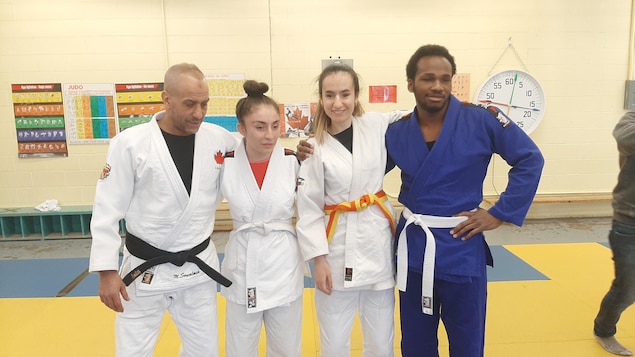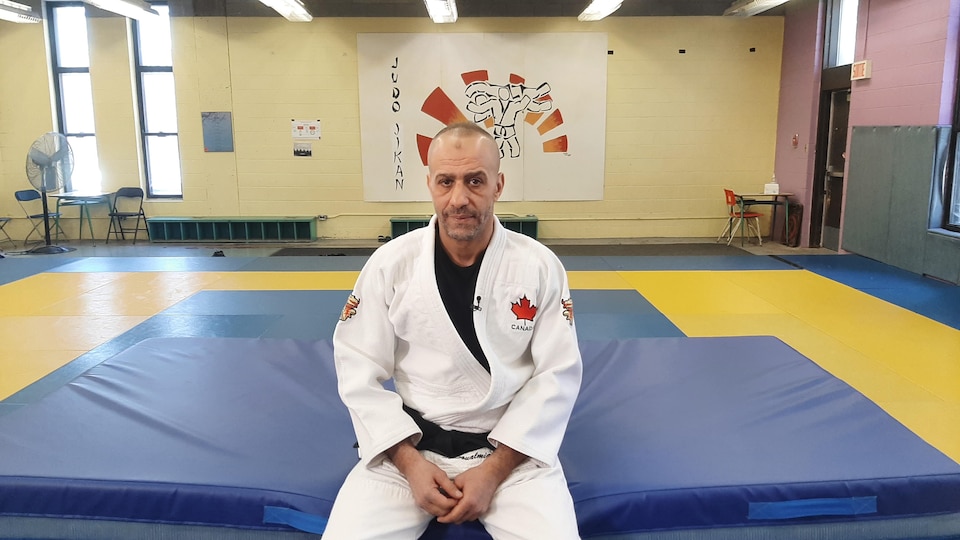Every week, the three teens and their white canes can be seen strolling to the Jeanne-Mance school in Montreal. At a certain step and accompanied by their trainers, they headed to the dojo of the Jikan club.
Once inside the door, the white canes allow for the whiteness of the kimonos. Sofia Soto, a psychoeducation student at the University of Montreal, threw herself at the tatami in disbelief. He greeted his friend Sylia Kacel who was studying classical singing and doing vocals while warming up. Eitel Houedakor is studying software development. The big man can’t wait to fight it out in a friendly way with his coaches and his two friends.
Their trainer is Mohamed Soualmia, a former Algerian and African champion. 20 years ago, he discovered that judo can be a fascinating teaching tool. That’s why he founded his club Jikan, which welcomes an eclectic clientele. There are dropout children and others with learning difficulties.

There are also those in diversion situations, who do not forget young people with autism, children with behavioral disabilities and, of course, the blind.
Eitel was a great sportsman before an accident that caused him to lose his sight. At age 12, a pyrotechnic exploded in his face. Far from being discouraged by this disability that cruelly invited himself into his life, he doubled his enthusiasm by training in athletics, wrestling and then judo.
A blind judo practitioner will use his sense of touch excessively.he explains.
That is what a blind person will always do. We will focus on how to feel the opponent’s movement and also feel the movement of his body. An advantage to those who see? Compared to a seer, the advantage I have seen is that I, as I cannot see, tend to concentrate on what I feel, whereas the seer is accustomed to focus on what he sees and then act.
You have to feel and react
During the exchange, Eitel Houedakor even surprised us by saying that his vision loss is not a disability. He wants to change people’s perception.
I learned that people can’t imagine what it is. In their minds, they think it is impossible to live without sight. So, there’s a kind of wall that suddenly breaks and that’s what I’m trying to do by showing that you can practice a sport and be blind.He added.
A feeling shared by Silya Kacel and Sofia Soto, who are blind from birth.
It is precisely in the beginning, we have something less, the view. But we are not always in a situation of disabilitysaid Sylia.
And Sofia adds: Yes, we lack vision, but we feel the movements one makes. We who are visually impaired have intact our reflexes and instincts. I wouldn’t say that I personally feel disadvantaged, that’s not a feeling that I have. I feel more like I have abilities like the person in front of me.
We are in a society where the eyes are in the middle of everything and we can’t imagine we could function any other way. We compensate with other senses and that is what we must explainexpressed with a force of conviction Sofia.
In tatami, coach Mohamed Soualmia gives advice and makes sure the gesture is perfect. For 20 years, he saw young people parked around him. Now his social judo, as he likes to call it, is done in nearly twenty schools in Montreal. He is proud to see the results and it gives him great pleasure that his sport has helped the poor youth.
I think that sport, and especially judo, with the values it implies, is the best way to manage this negative energy in young people, he believes. Yes, I am proud to see young people returning to school after quitting. Others come out of delinquency and find real values. They found a job, started a family. I am glad to see that most have become responsible citizens.
When we talk to him about his blind students, his face lights up.
I started judo blind to Silya, he said. At first, he was scared. During submissions that consist of immobilizing an opponent on the ground, he is afraid to contact. Then, little by little, he tamed these clinches and he freed himself. Now he wants it! He even participated in the International Open for Adapted Sports.
For me, it’s a source of pride when I see these young people, who, on the mat, are spending more than others. And another pride is inclusionhe continued.
When we see them fighting with others, we don’t notice that they are blind in judo class. They do the same things as everyone else. It’s even surprising that they sometimessaid sensei full of emotion.
Surprising. The adjective is not very strong. When you see how easily these three young people work with tatami, no one will suspect that they have lost their sight. What they want now is to be treated as people in their own right.
If you see us on the street with a white cane or we are doing any activity, come and ask us a question instead of thinking of a few things, says Sofia. It’s true that we really face judgments, in the eyes of people who tell themselves that you certainly can’t do it. But ultimately, no. What we want is to be able to exchange and share.
In the middle of training, a voice as melodious as surprisingly comes from the tatami. This is for Sylia Kacel. A moment of magic where time seems to stop. She is singing an a cappella an opera aria.
Sylia reached the semi-finals of The voice of the junior in 2017 and he moved all over Quebec with his shows. One who has been singing since the age of 5 dreams of someday becoming a great classical singer.
As he sang on the carpet, everyone stopped to listen to him until the very end. The applause rang out and the practice continued with smiles on their faces that said a lot about this little moment of shared happiness.
Before leaving, Mohamed had a message.
After 20 years, I discovered that everything is possible, that we can change in an easy way like sport, like judo. You just have to trust yourself.
You know, I came from Algeria and judo fired me the wrong way. The disabled, for me, are the ones who don’t make the effortcoach added with a hint of nostalgia in his throat.
When we talk about victories with the former champion, he answers humbly.
My personal success is when we succeed in delivering something that is beneficial to society. Develop people who will enlighten society and send. This is my success!
Within hours, these three judokas and their trainer showed us one thing: what we believe is not necessarily handicapped.
Source: Radio-Canada

